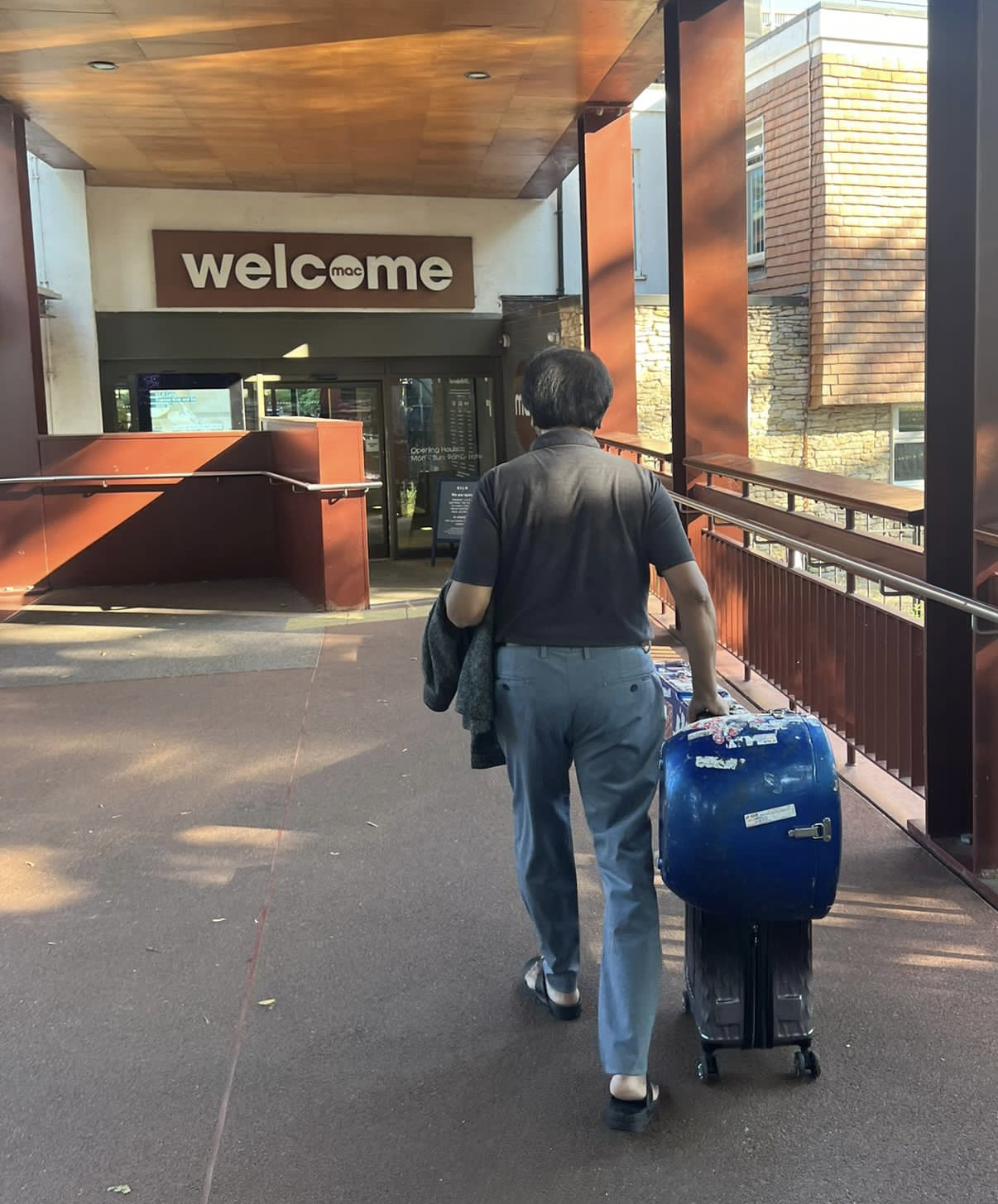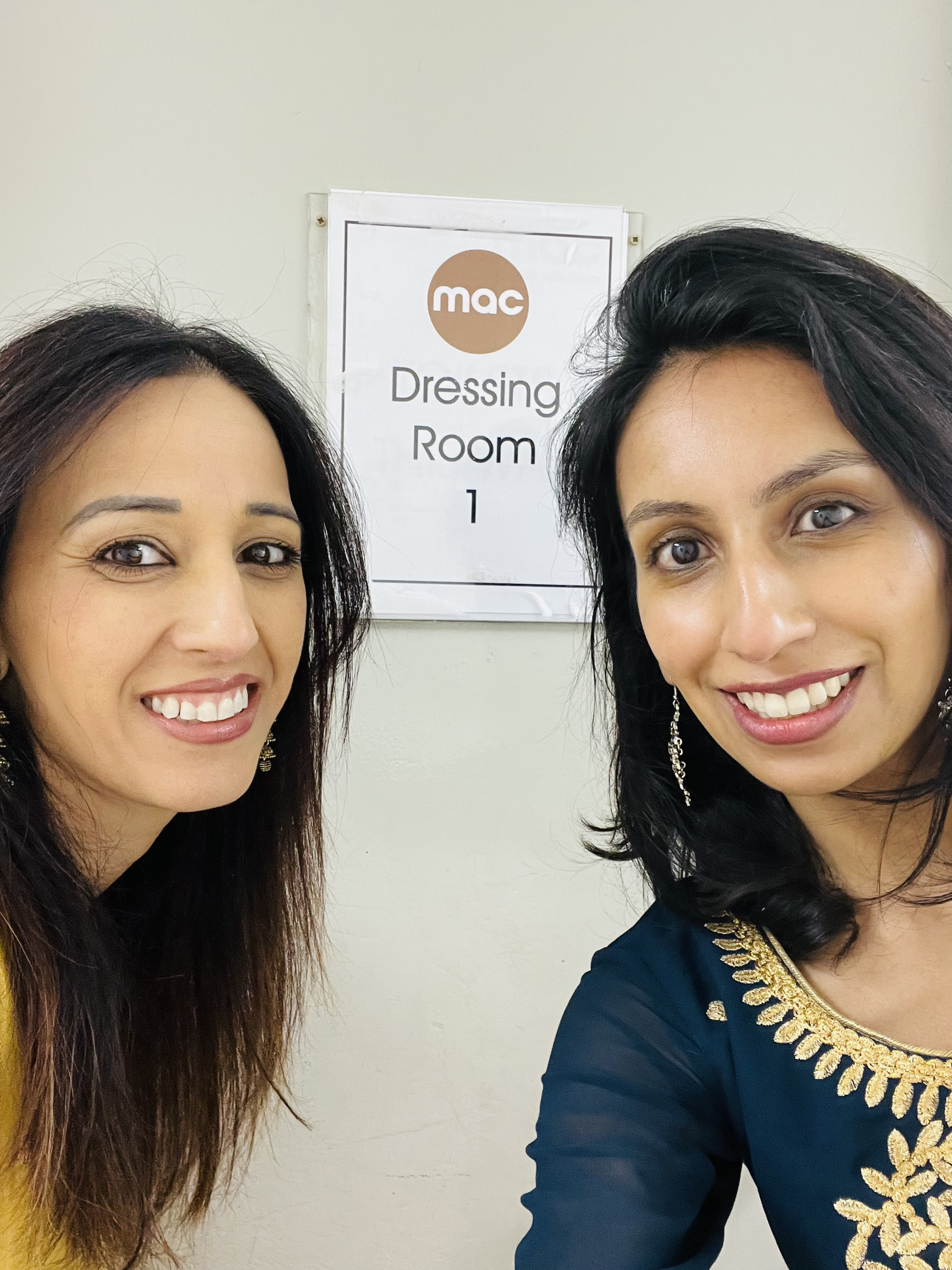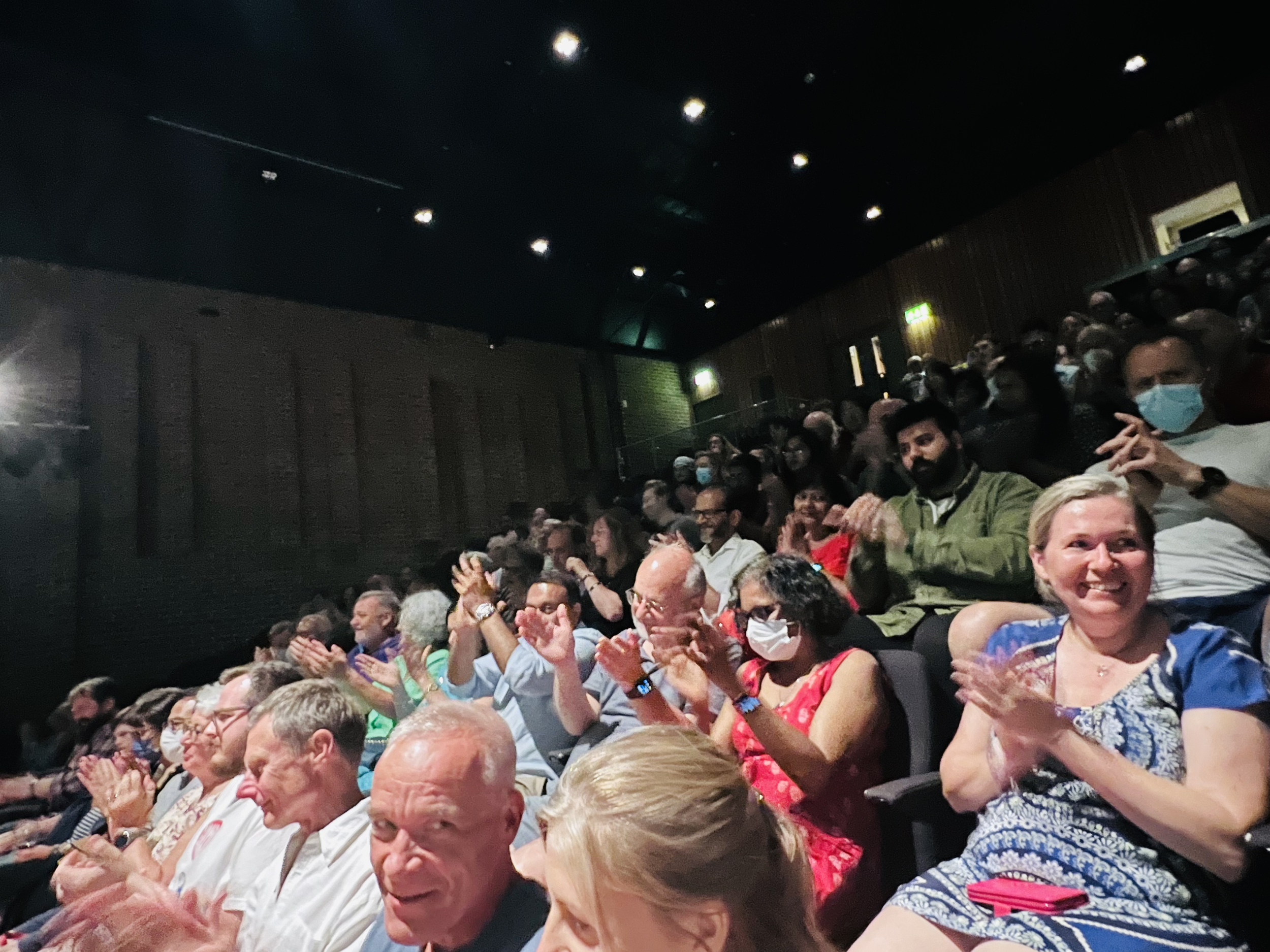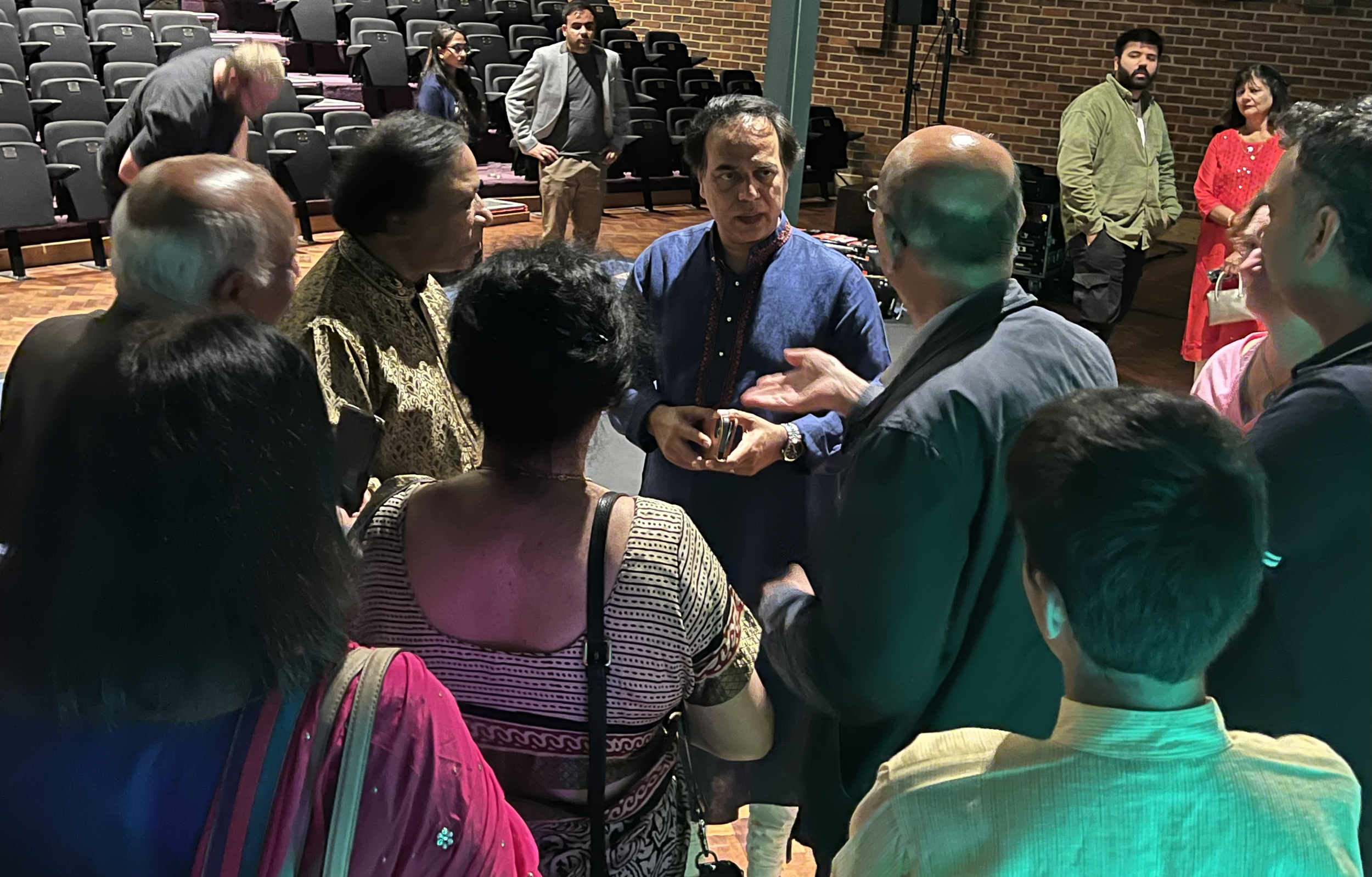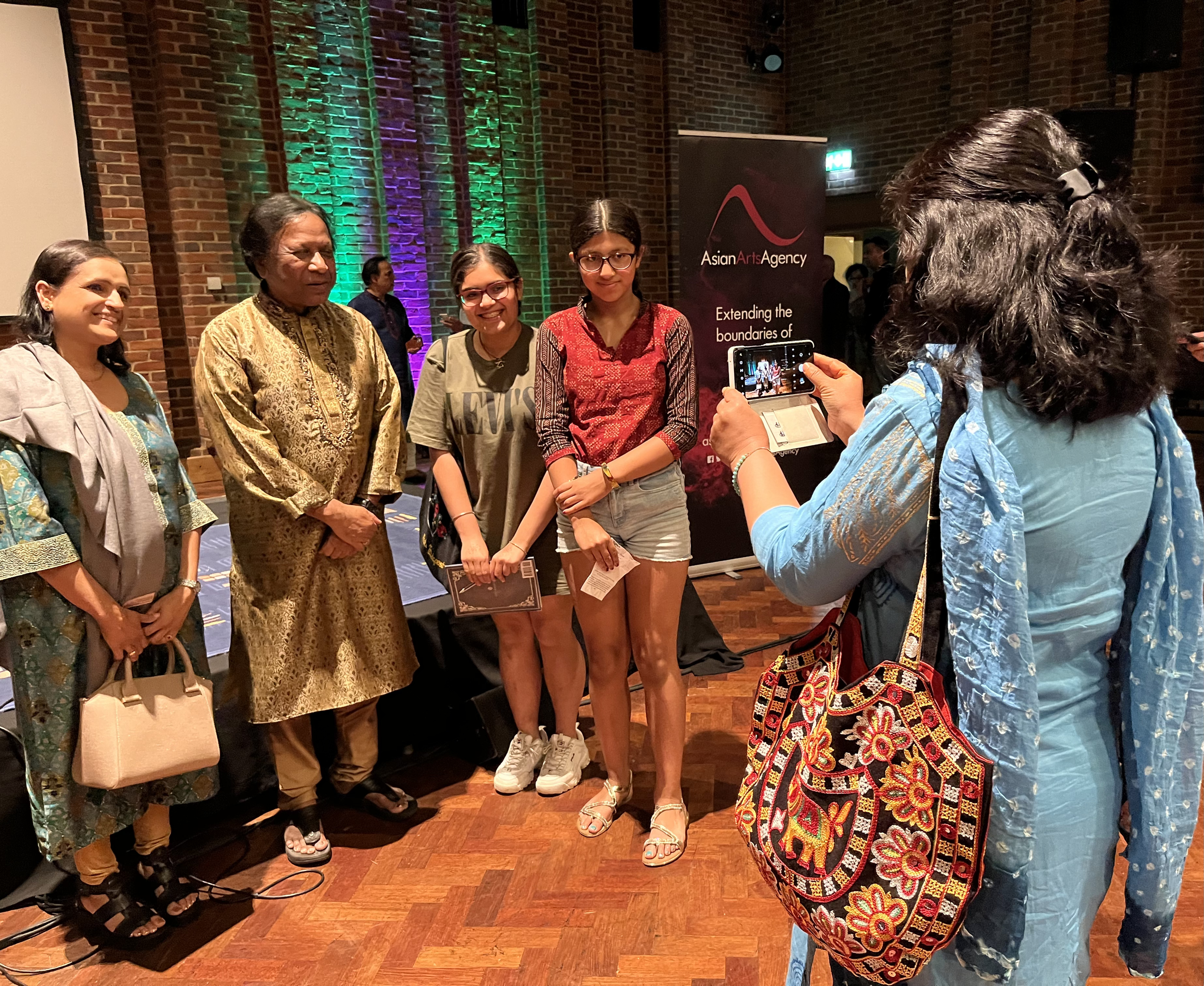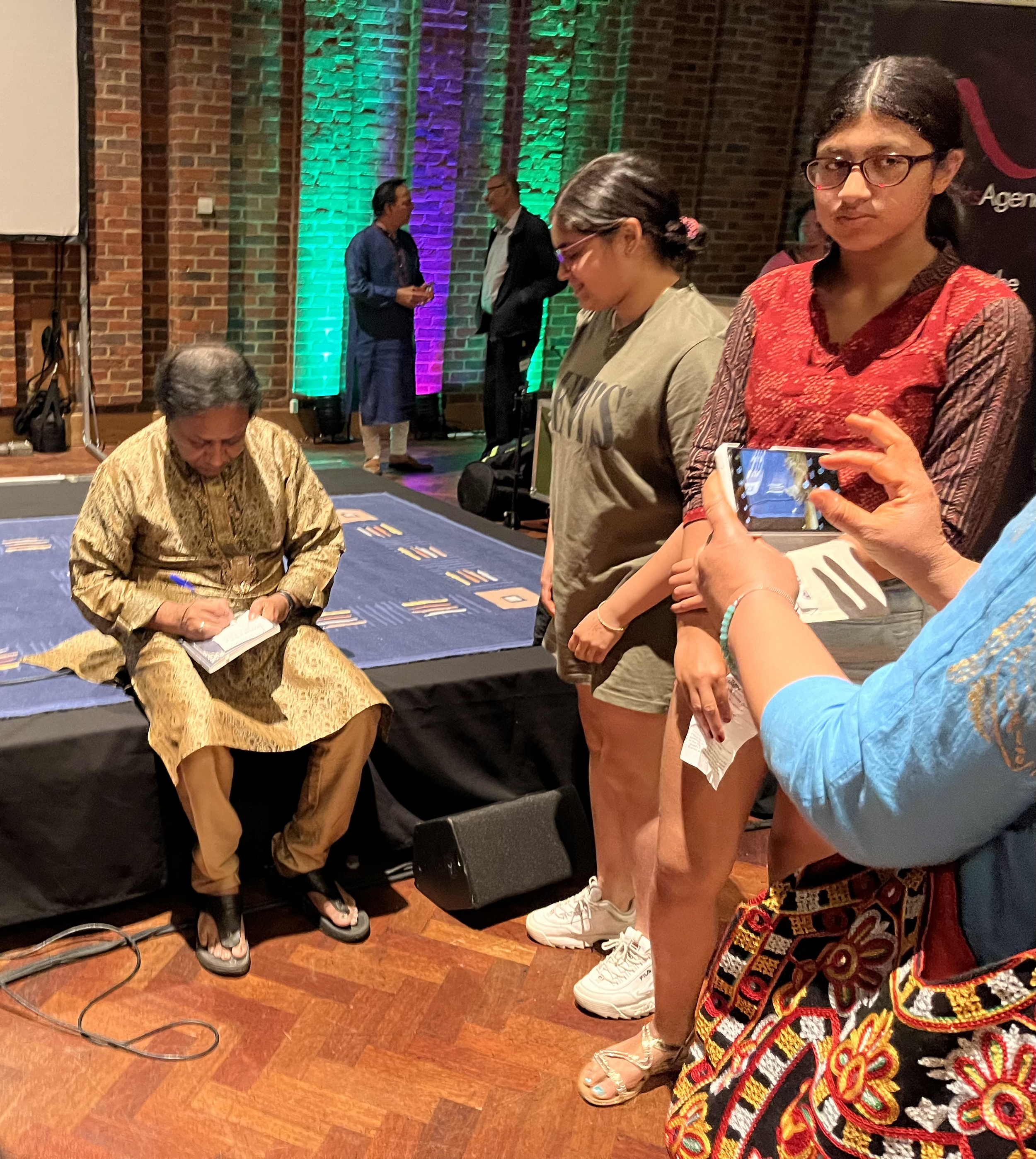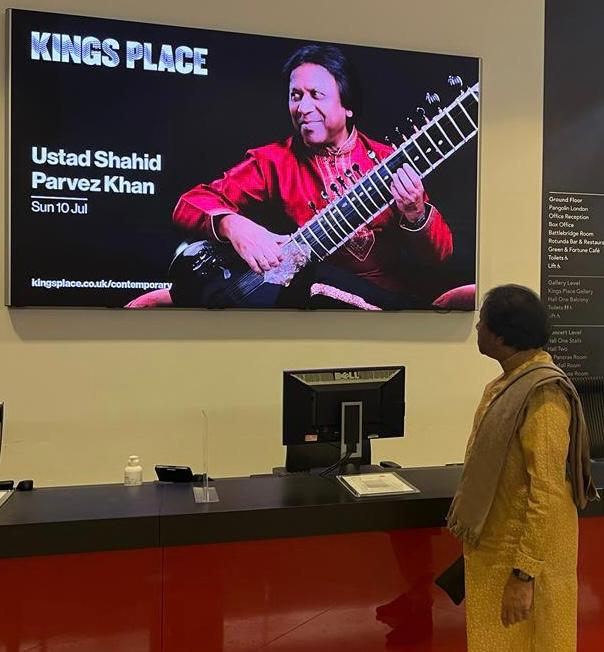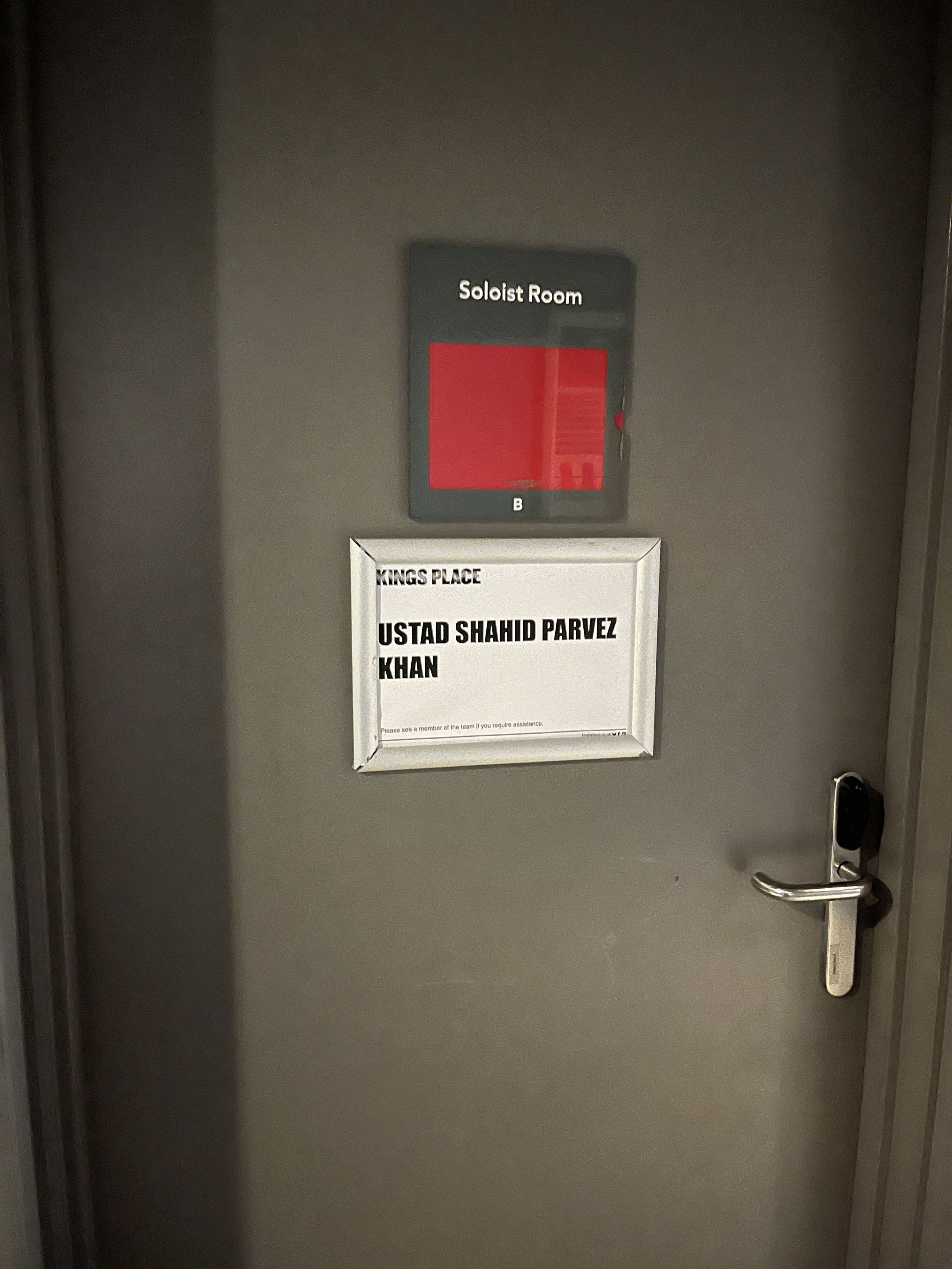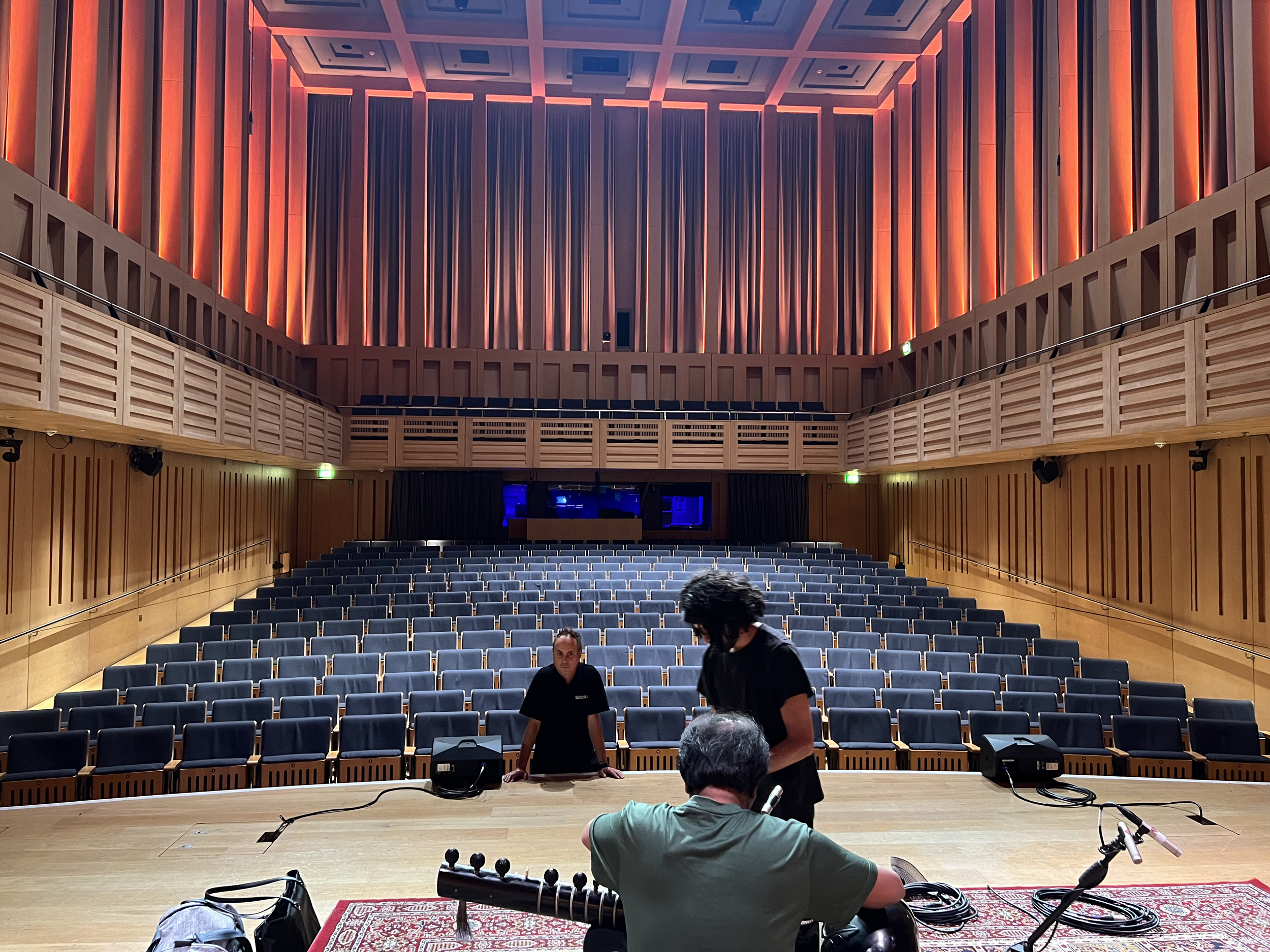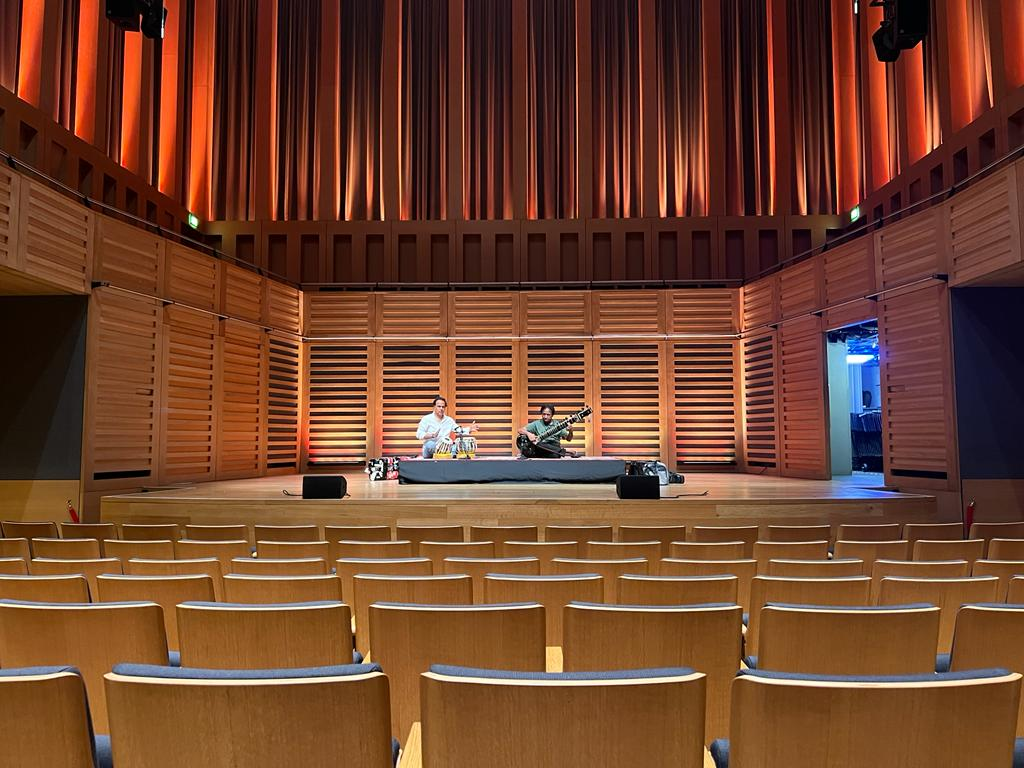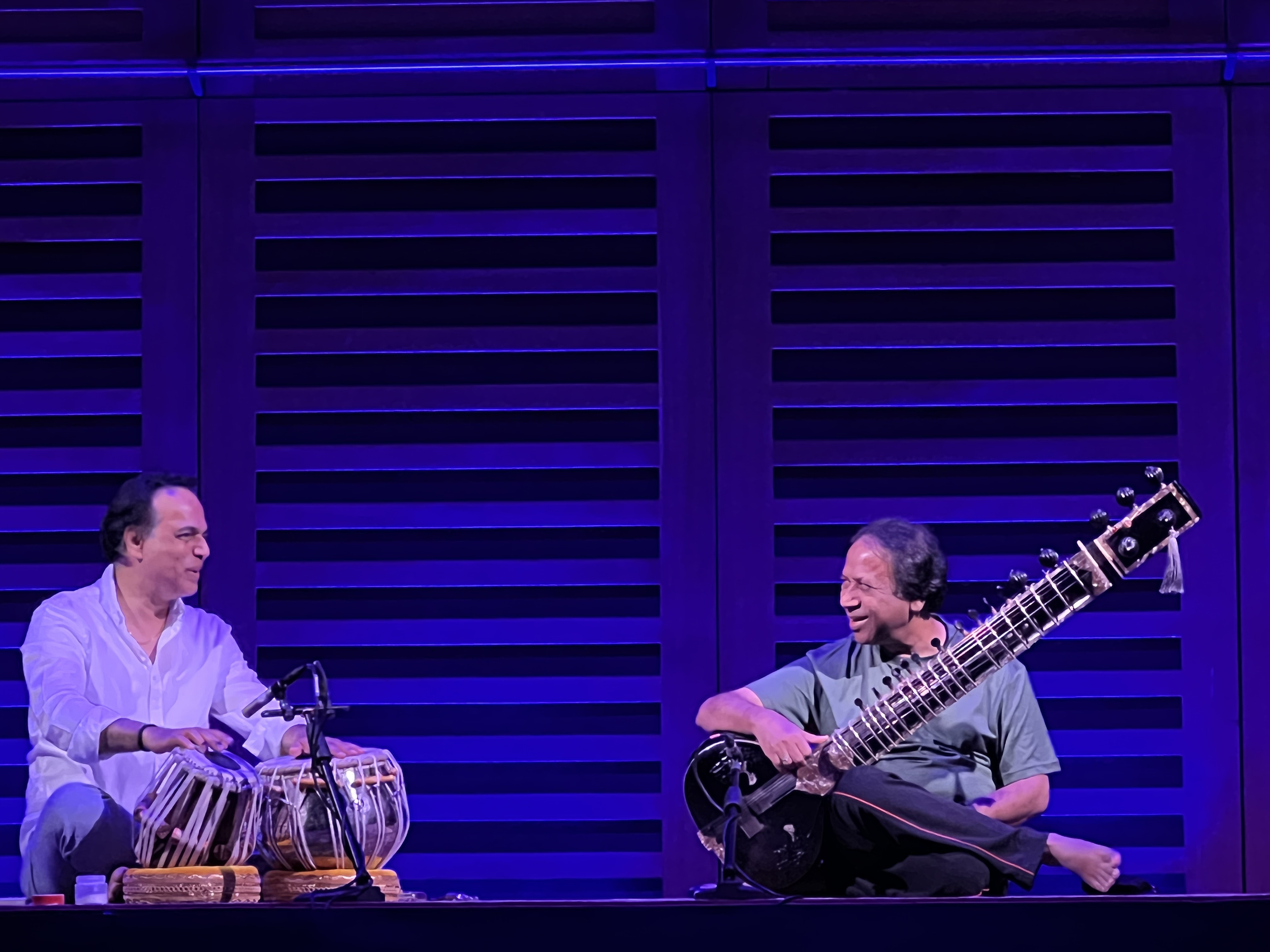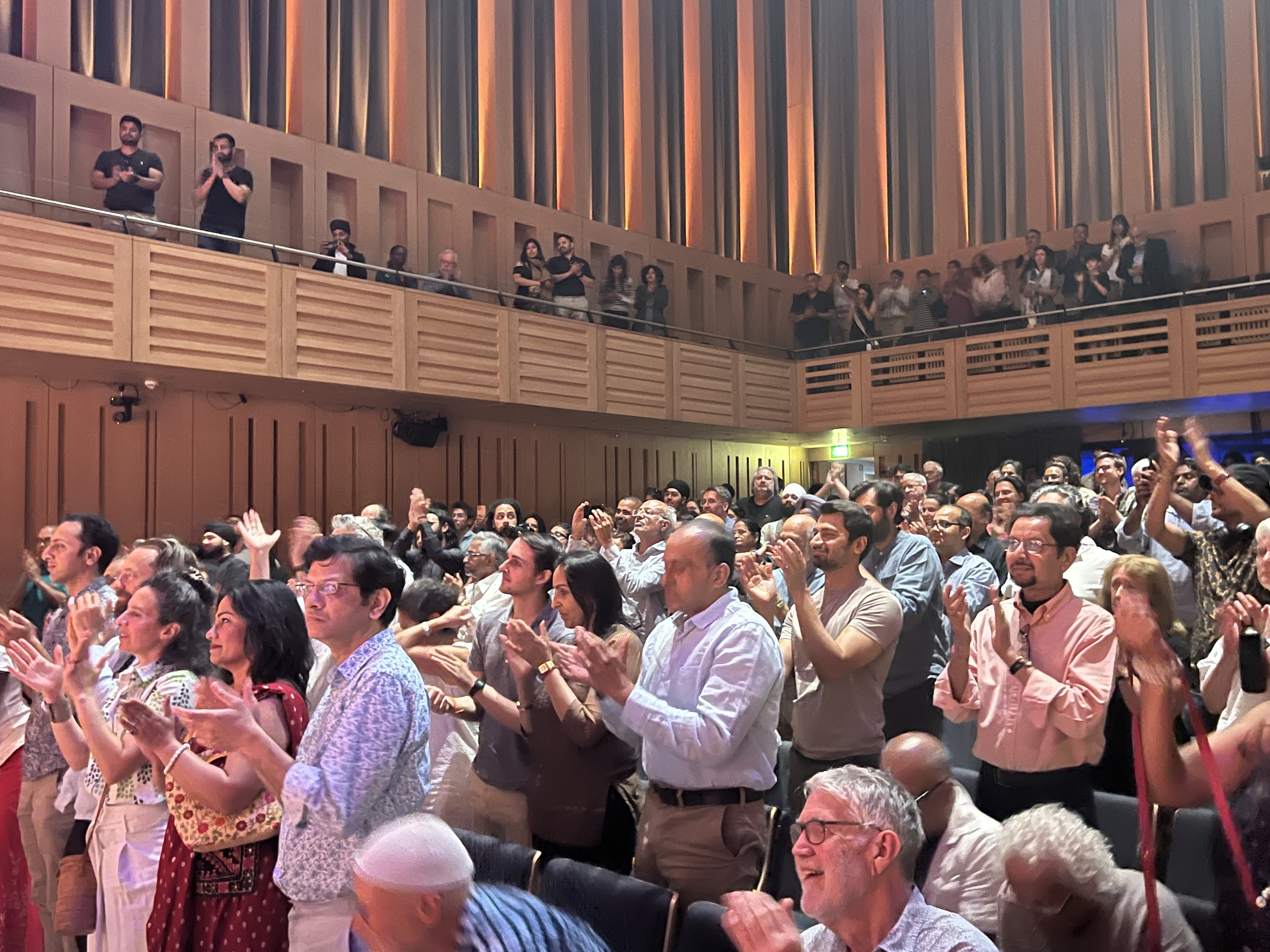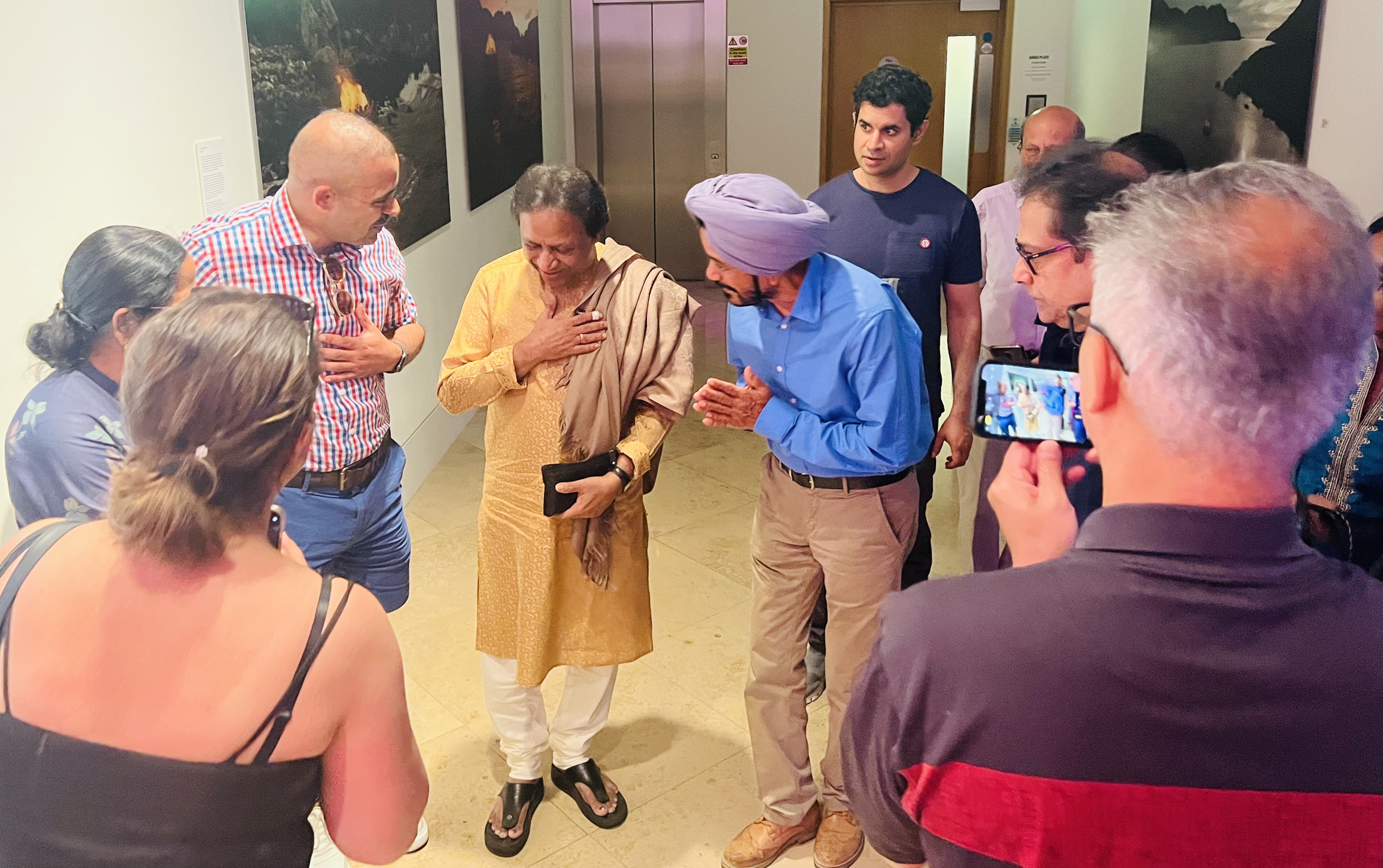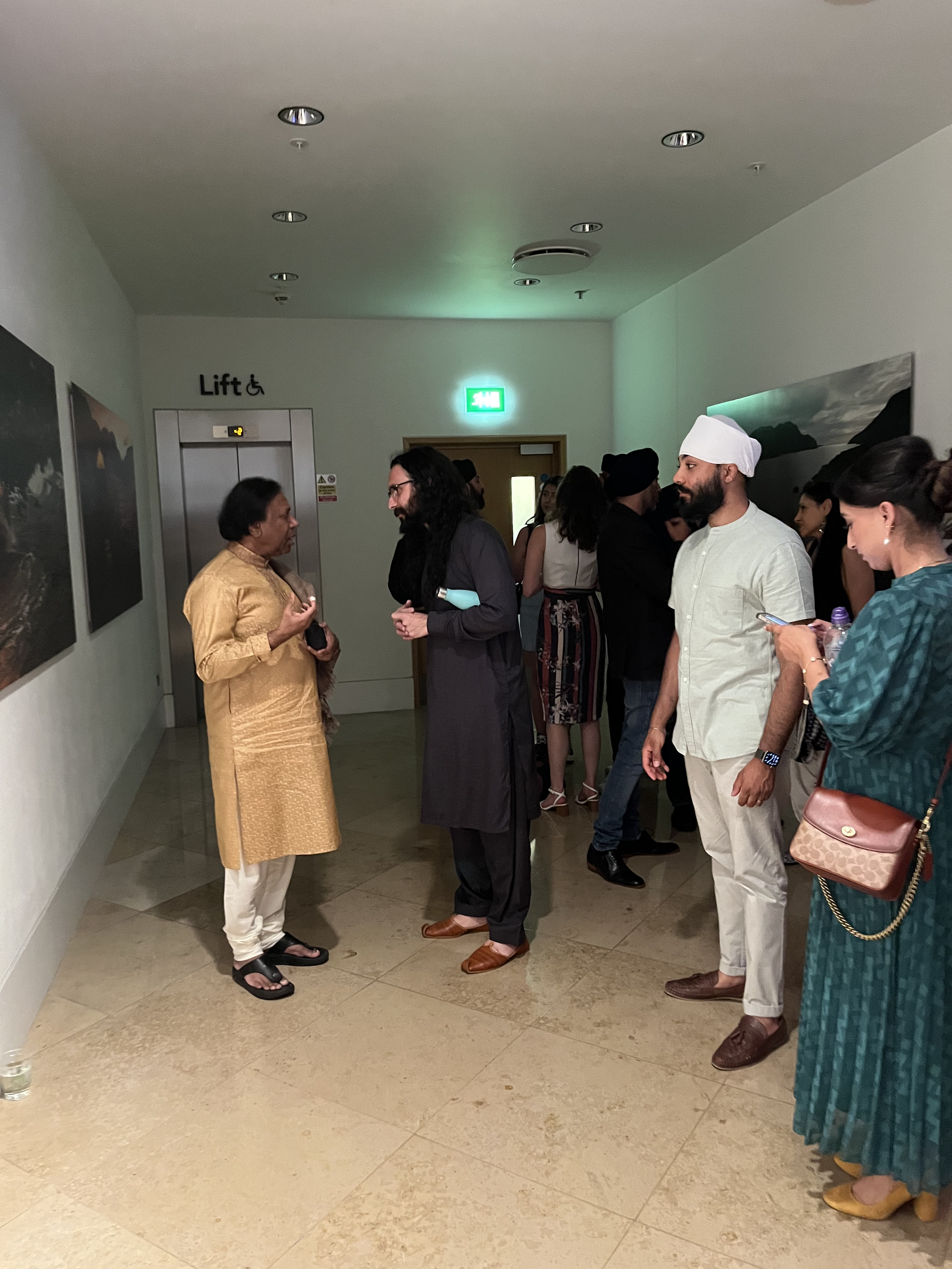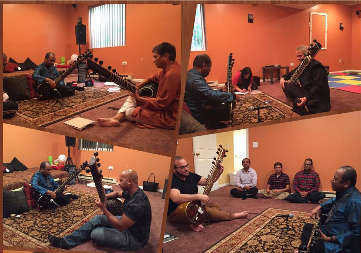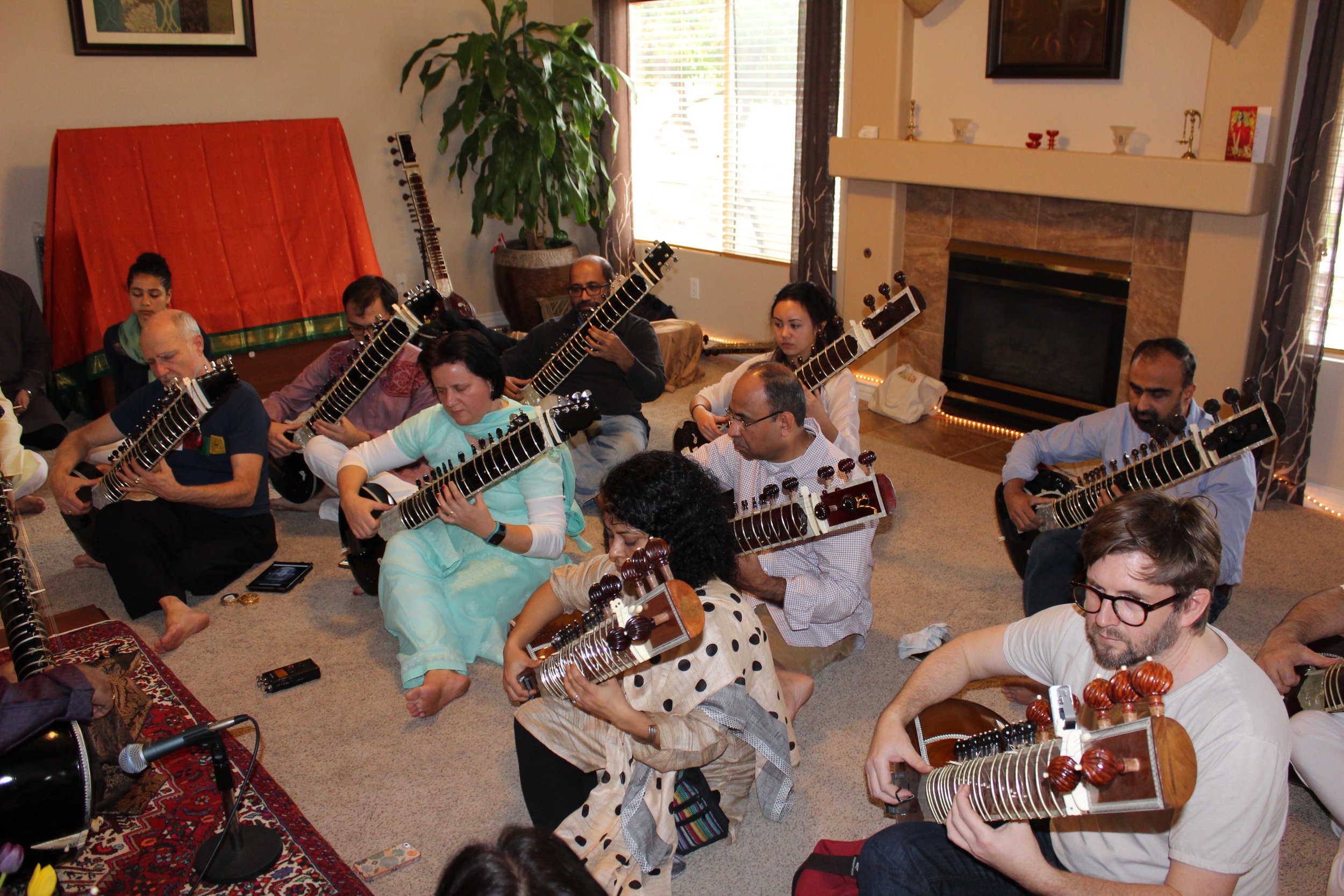The SPK Academy of Music recently celebrated Guru Purnima with Ustad Shahid Parvez Khan. Sitar students of all ages performed for their guru, showcasing their acquired knowledge and paying their respects to the sitar maestro.
On tour with Ustadji ...
SPK student Alpa Shah joined Ustadji and Seema for Ustadji’s (Ustad Shahid Parvez Khan) recent concert tour in the United Kingdom, her home country. Here we share some of her musings and observations from the tour experience.
Wednesday, July 6: ¡Vamos!
Ustadji and Seema arrive in London. It’s the start of the long-awaited tour to the UK, with concerts in Birmingham, Southampton, London, and Bristol, all in the space of 5 days.
We open Ustadji’s instrument flight case to do the all-important sitar check, breathing a collective sigh of relief when we see that the sitar has made it unscathed in and out of the luggage hold and through the dreaded conveyor belt.
Today is a rest day with a few phone calls to organize logistics for tomorrow’s concert. Rafael Nadal’s quarter-final Wimbledon match is on today - Ustadji is a major tennis (and Rafa) fan and the ups and downs of the match keep everyone awake and adjusting well to the time zone.
Thursday, July 7: Birmingham Bageshree
The tour bus arrives to collect us in the early afternoon. Well, it’s more like a large van rather than a bus, and with a comically oversized cargo trunk (boot), in which we place exactly one suitcase, a backpack, and Ustadji’s sitar.
A 2.5-hour drive, one motorway service stop, and several 1950s Bollywood songs later, we arrive at the concert venue, the Midlands Arts Centre, which is located next to the famed cricket ground, Edgbaston.

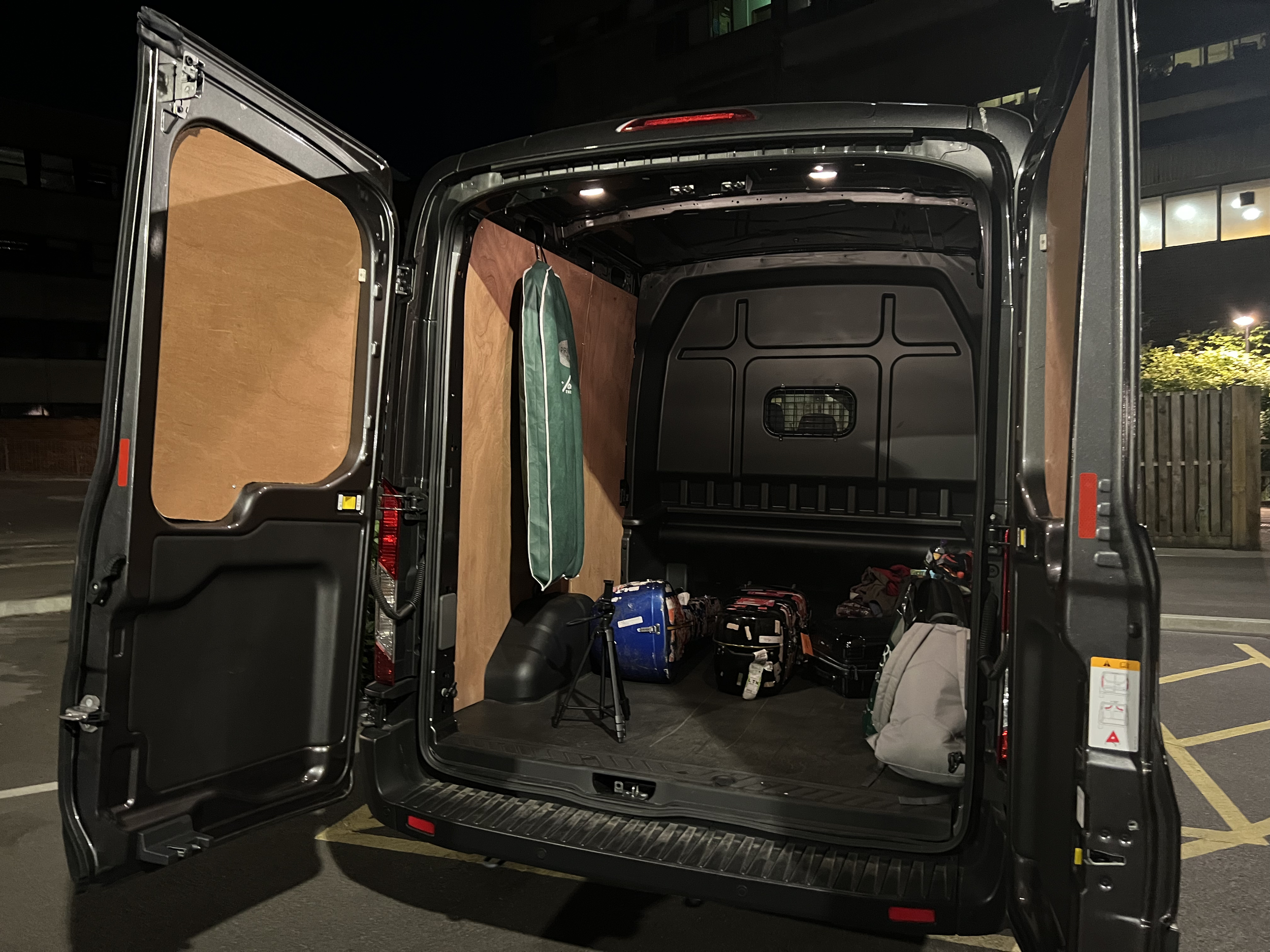

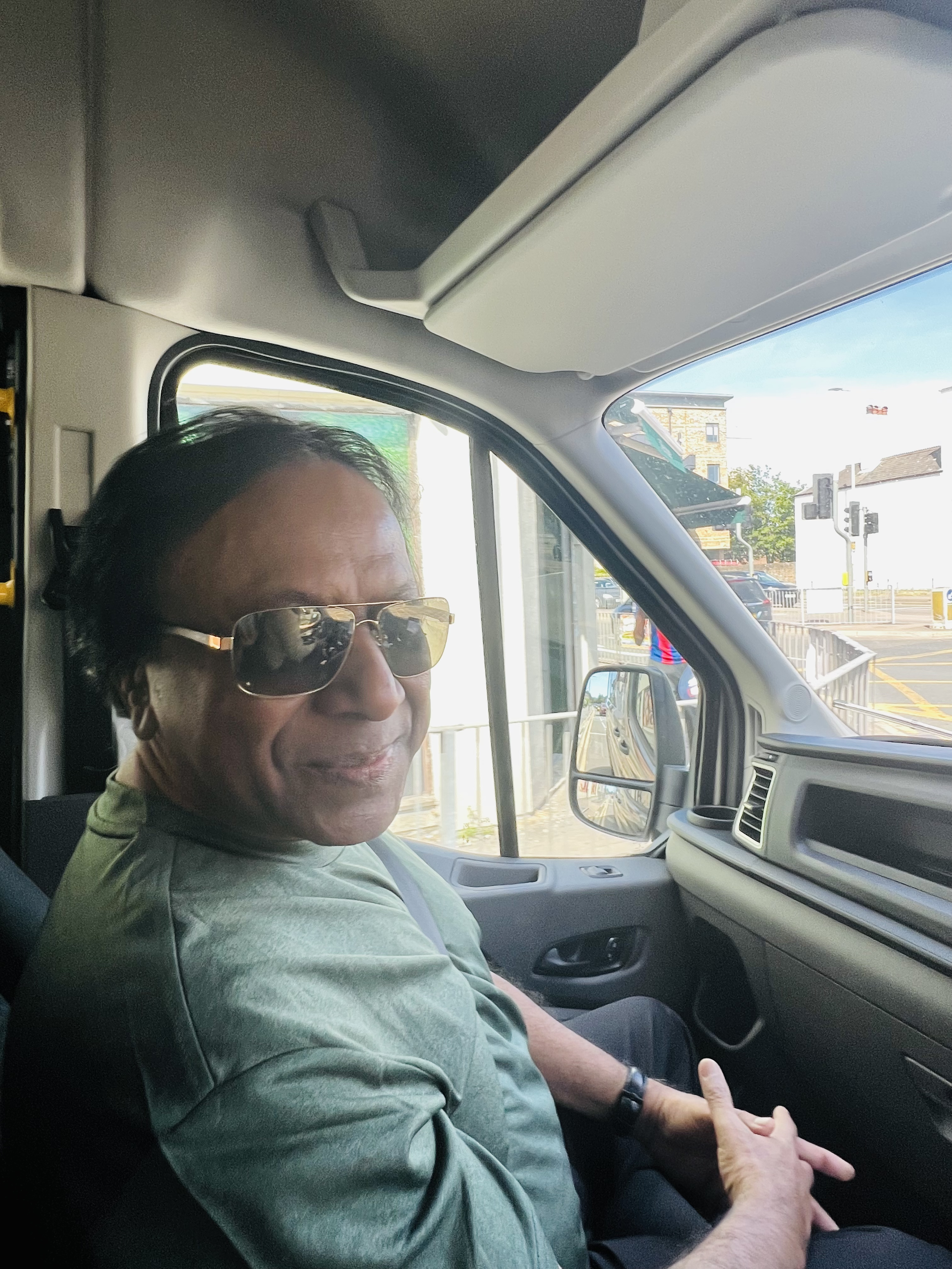
We’re cutting it a little fine, I think - it’s just an hour and a half until the concert begins, but everyone seems fairly relaxed. We enter the venue, and we are shown the dressing room where we drop off our luggage. Then, straight to the sound check, where we meet the sound technicians and the tabla accompanist, Pandit Sanju Sahai.
Sound checks, as I learn during the tour, are long and sometimes tedious processes requiring an immense amount of patience and attention to detail. At each venue, Ustadji takes the time to meet the sound team and talk them through the adjustments he is looking for. The first sound technician’s name is Adam (easy for Ustadji to remember, since it is also the name of one of his shagirds). Today, the whole process takes an unusually long time.
At some point, I stop hearing any difference in the sound, but Ustadji asks for further adjustments to make sure that the acoustics are just right.
During the sound check process, Ustadji warms up, playing alaap, gat and taans, giving us a clue as to which raag we might hear in the concert. Today our money is on Raag Bageshree. It is such a treat, our own sneak preview in an empty hall - a whole secret mini concert to ourselves.
Fellow Group Abhogi members, this one is for you :)
Sometimes he humors us, playing variations on what Seema and I have been practicing at home. This time also gives the tabla player some clues as to what he may be required to play in just under an hour, and to get prepared!
With only 20 mins to go until the concert starts, it is a rush to get stage ready (including kurta ironing!) in time to have a quick cup of tea and a snack before the show starts. This process really requires a huge degree of inner zen and confidence, I think to myself - Ustadji shows no sign of any sort of stress or panic; he is as cool as a cucumber. Then, it’s showtime!
The performance is spectacular (it is indeed Bageshree). It’s the first time I’m hearing Ustadji live in-person since 2019, and I am reminded even more strongly how uniquely and effortlessly he plays to such perfection.
The concert hall is full and the audience reacts instinctively to the performance as it unfolds, with gasps, and cries of ‘Wah wah wah’, ‘Kya baat hai’ when Ustadji pulls a crazy meend or performs clever rhythmical feats with his taans.
I also feel relieved to have finally found some British people who enjoy Indian Classical Music - they may be few and far between, but they do exist! The concert ends (as most of them do) with a standing ovation. Fans come to greet Ustadji, pay their respects and take photos.
Saturday July 9: Southampton and ‘Les Mizrab’
We return to London the next day for one night of rest, before heading to Southampton. The next three days will involve consecutive nights of concerts. While incredibly exciting, it is clear that life on tour involves an immense amount of stamina. I’m only tagging along and helping out, and even I begin to feel the slight fatigue of travel, packing, carrying luggage around, and late nights.
We arrive in Southampton in good time, and there is a fair amount of waiting around as things get set up. Pizza is ordered for the green room, and Ustadji asks about dinner arrangements. I notice that while most logistical details are left to Seema to deal with as his manager, Ustadji always weighs in on matters of food. It is well-known that musicians are typically big foodies, enjoying late-night post-concert dinners, and Ustadji is no exception.
Partly driven by his love of good desi food and partly due to the sheer amount of physical effort he is exerting during his performances, he is keen to make sure there are snacks available before the show and a hearty meal awaits afterward. Today it seems that we will need to order in for dinner, as restaurants will mostly be closed by the time the concert ends. Ustadji thoughtfully selects dishes from the menu from a local restaurant, catering to everyone’s tastes.
Interestingly, today’s audience is primarily non-Asian, and Ustadji adjusts his concert introduction a little, explaining the nature of raag and the structure of the performance (he will be playing Raag Gavati). Still, the audience interacts and expresses themselves well, clapping at key moments to show their appreciation and acknowledgment of Ustadji’s musical skill, adding to the vibrant energy in the auditorium.
Everything seems to be going smoothly. And then, as far as sitar concerts go, midway through the first half, drama strikes.
While he is playing (an insanely fast) jhalla, Ustadji’s mizrab breaks, bringing the performance to a halt. Uh-oh!
And there are no mizrabs hooked onto the tarab pegs ready to use. Now what? Definitely a situation that would cause a spike in blood pressure for most SPK Academy students.
Ustadji calmly puts down the sitar, and looks in his sitar pouch for a new one, instructing Sanjuji to carry on the show for a minute with a tabla solo. It takes him a moment to find a replacement mizrab, but still no sign of any sweat or stress from Ustadji.
And even though we can tell that the new mizrab does not fit optimally, the concert goes on. During the intermission, a more suitable mizrab is located for the second half. Phew!
Sunday, July 10: London Calling
Time for the concert we (or rather I, being a Londoner) have been waiting for, at the new and prestigious King’s Place! We head to London from Southampton in the morning and onto the concert venue in the afternoon after a quick lunch.
As we enter King’s Place, there is a large digital poster of Ustadji displayed above the main reception. The venue staff members are clearly excited to see him walk through the doors, instantly recognizing him. It feels quite fun to be a part of the ‘celebrity crew’.
“We’re with the artist”, Seema and I say, as we navigate our way around the security-controlled backstage area.
The venue is new and very polished, and the sound check is smooth, giving Ustadji time for a much-needed nap in the green room, having been on the road much of the day.
During the first half of the concert (today it’s Raag Rageshree), Seema and I sit in the concert hall's balcony rather than in the front row, to try and get a variety of photos and footage of the performance.
It feels strange to be so far away from the stage - one of the special things about being in the front row is the way in which Ustadji interacts with us during the performance, and sees our reactions to his music. We decide to move to the front for the second half.
The concert ends and a large crowd of fans waits in the foyer to greet Ustadji. He comes out and meets each of them, talking to them, taking countless photos, and giving many autographs. Again, I marvel at Ustadji’s stamina to do this after a two-hour performance.
After the fans leave, we are treated to a delicious dinner at a Punjabi restaurant in Covent Garden. It’s the oldest in the UK, we are told, and frequented by many well-known visitors from the subcontinent. Well, now they can add Ustadji to that list!
Monday July 11: Bristol Bravo, Bravo Bristol!
Ustadji and Seema head to Bristol the next day, and I stay home to prepare to travel to Phoenix the following morning for Guru Purnima.
That evening, as Seema sends over photos of the stunning venue (St Georges) and video clips of the concert (today is Raag Yaman), I wish I could be there. It ends with a standing ovation and calls for an encore, to which Ustadji obliges.
Another successful tour concluded. I loved the experience - it was truly special to be there behind the scenes, and a real treat to listen to three of Ustadji’s concerts in such a short space of time.
Thank you to Ustadji and Seema for letting me be part of it.
Anusri Mittal
At age five Anusri attended her brother’s tabla lesson but was powerfully drawn to the melodies of sitars being played nearby. Four years later, in 2010, she found the SPK Academy and began to learn sitar in the Etawah tradition. She was nine years old. However, there was a major obstacle to overcome, as her family moved to China that summer. Thus she became the Academy’s first Skype student, waking up at 6 in the morning to accommodate the time difference. When Anusri finally got the opportunity to study with Ustadji in person at shibirs and workshops, she had yet another obstacle to overcome - her innate shyness. Once again love for the music prevailed as she traveled from her new home in Detroit to learn in Phoenix. Anusri’s progess on the instrument attests to her level of dedication. She presently lives in California.
When you started the sitar, did the influence of your parents affect your decision to learn?
It was my choice to start, but sometimes they would force me to practice. Now I’ve realized that if I want to progress, I need to practice.
Do you enjoy playing sitar?
I do enjoy it. Even if I’m doing something else, I’ll find myself playing taans in my head.
What is your favorite raag?
Yaman.
Have you been to any shibirs?
I attended a shibir many years ago and then one in Phoenix last January. It’s a very creative environment; there’s always people practicing, you can hear sitar everywhere. It’s a perfect time to just focus on sitar.
What are your plans for the future?
I’m graduating from Valencia High School next May, and plan to attend a four-year college, to major in either marketing or international relations. I also want to continue learning Chinese.
Do you have a specific musical goal?
Yes, I want to be able to play all of the pieces where I pull, and do it comfortably.
Do you have any thoughts you’d like to share about the Academy?
SPK Academy has been a great experience, and I’m very happy to have been a part of it for the last eight years. Everyone is very encouraging. And it’s such an honor to learn with Ustadji, I’m very thankful for that.
Ustadji says Anusri has all the qualities necessary to become a fine sitarist. She has shown both commitment and talent and he encourages her to follow her musical dream.
SPK Academy of Music student, Anusri performs for Ustad Shahid Parvez Khan and other SPK Academy students at a weekend-long intensive workshop/shibir.
The SPK Academy Learning Experience
Many music academies exist, but few that rigorously uphold the tradition of the guru-student relationship, or guru-shishya parampara; here at SPK Academy, this is the foremost pillar of our foundation. Though Ustadji uses a variety of more modern techniques, such as Skype, to impart his musical knowledge, the tradition itself remains intact. However, no amount of online lessons can replace the experience of in-person lessons, for it is not only material being taught, by observing the guru, how he lives apart from music, his philosophies, personality, only then can his music be more deeply understood, and ultimately, played.
It is at a shibir, a three-day music camp, where the magic happens, where for those three days, no matter how long it has been, we are instantly at home in the company of our fellow students and Ustadji.
One student writes, “...Shibirs. Weekends away from everything, when I can truly focus on my passion - music. These amazing events give me a chance to spend first hand time with those I consider family, and at the heart of it all is my guru, my Ustad.”
~Avichal Jha
To the newcomer, the first shibir can be very intimidating, but by the third or fourth, one knows what to expect, and what is expected of him or her, but even within the usual shibir schedule, it is really Ustadji’s mood that dictates the flow of the shibir. It is not an easy art, but like all difficult things, every minute of hard work and practice is rewarded in the end. Whether you are simply curious or wish to pursue music seriously, a shibir is the place to experience Ustadji’s music in all its brilliance; it is the place to discover and or deepen musical love.
Workshops provide a shibir-like environment that is accommodating to those who cannot attend shibirs, due to busy work schedules, as well as a supplement to keep students on track as shibirs are usually spaced several months apart. At workshops, students can receive undivided attention from Ustadji (Ustad Shahid Parvez Khan)
Skype lessons with Ustadji offer musical training to students who are travelling or unable to attend workshops or shibirs, and are an invaluable tool we can use to stay connected to music.
Senior students Gagandeep and Jay shared their thoughts on Skype lessons.
“I would describe Skype lessons with Ustad ji as a great medium of instruction. It's as real as it can get to replicate a one on one in-person experience of learning from Ustadji. What I like most about Skype classes is that the content of class is tailor-made to suit your individual learning needs. It's Ustadji speciality to come down to the level of the learner, irrespective of his/her proficiency level or command of the instrument.”
~Gagandeep Singh
“It provides priceless one on one time with Ustadji, something that can be very difficult to obtain during a large shibir or group workshop. When the Shagirds get together, we always ask each other, "Have you had any Skype lessons? What are you working on?”
~Jay Matrona
Each mode of learning offers something unique, but the combination of shibirs, workshops, and Skype lessons fulfills all of a student’s musical needs, making for a complete learning experience.




